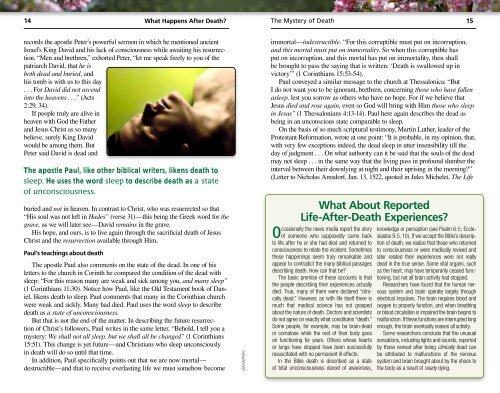what-happens-after-death
what-happens-after-death
what-happens-after-death
You also want an ePaper? Increase the reach of your titles
YUMPU automatically turns print PDFs into web optimized ePapers that Google loves.
14 What Happens After Death? The Mystery of Death15records the apostle Peter’s powerful sermon in which he mentioned ancientIsrael’s King David and his lack of consciousness while awaiting his resurrection.“Men and brethren,” exhorted Peter, “let me speak freely to you of thepatriarch David, that he isboth dead and buried, andhis tomb is with us to this day. . . For David did not ascendinto the heavens . . .” (Acts2:29, 34).If people truly are alive inheaven with God the Fatherand Jesus Christ as so manybelieve, surely King Davidwould be among them. ButPeter said David is dead andThe apostle Paul, like other biblical writers, likens <strong>death</strong> tosleep. He uses the word sleep to describe <strong>death</strong> as a stateof unconsciousness.buried and not in heaven. In contrast to Christ, who was resurrected so that“His soul was not left in Hades” (verse 31)—this being the Greek word for thegrave, as we will later see—David remains in the grave.His hope, and ours, is to live again through the sacrificial <strong>death</strong> of JesusChrist and the resurrection available through Him.Paul’s teachings about <strong>death</strong>The apostle Paul also comments on the state of the dead. In one of hisletters to the church in Corinth he compared the condition of the dead withsleep: “For this reason many are weak and sick among you, and many sleep”(1 Corinthians 11:30). Notice how Paul, like the Old Testament book of Daniel,likens <strong>death</strong> to sleep. Paul comments that many in the Corinthian churchwere weak and sickly. Many had died. Paul uses the word sleep to describe<strong>death</strong> as a state of unconsciousness.But that is not the end of the matter. In describing the future resurrectionof Christ’s followers, Paul writes in the same letter, “Behold, I tell you amystery: We shall not all sleep, but we shall all be changed” (1 Corinthians15:51). This change is yet future—and Christians who sleep unconsciouslyin <strong>death</strong> will do so until that time.In addition, Paul specifically points out that we are now mortal—destructible—and that to receive everlasting life we must somehow becomeiStockphotoimmortal—indestructible. “For this corruptible must put on incorruption,and this mortal must put on immortality. So when this corruptible hasput on incorruption, and this mortal has put on immortality, then shallbe brought to pass the saying that is written: ‘Death is swallowed up invictory’” (1 Corinthians 15:53-54).Paul conveyed a similar message to the church at Thessalonica: “ButI do not want you to be ignorant, brethren, concerning those who have fallenasleep, lest you sorrow as others who have no hope. For if we believe thatJesus died and rose again, even so God will bring with Him those who sleepin Jesus” (1 Thessalonians 4:13-14). Paul here again describes the dead asbeing in an unconscious state comparable to sleep.On the basis of so much scriptural testimony, Martin Luther, leader of theProtestant Reformation, wrote at one point: “It is probable, in my opinion, that,with very few exceptions indeed, the dead sleep in utter insensibility till theday of judgment . . . On <strong>what</strong> authority can it be said that the souls of the deadmay not sleep . . . in the same way that the living pass in profound slumber theinterval between their downlying at night and their uprising in the morning?”(Letter to Nicholas Amsdorf, Jan. 13, 1522, quoted in Jules Michelet, The LifeWhat About ReportedLife-After-Death Experiences?Occasionally the news media report the storyof someone who supposedly came backto life <strong>after</strong> he or she had died and returned toconsciousness to relate the incident. Sometimesthese happenings seem truly remarkable andappear to contradict the many biblical passagesdescribing <strong>death</strong>. How can that be?The basic premise of these accounts is thatthe people describing their experiences actuallydied. True, many of them were declared “clinicallydead.” However, as with life itself there ismuch that medical science has not graspedabout the nature of <strong>death</strong>. Doctors and scientistsdo not agree on exactly <strong>what</strong> constitutes “<strong>death</strong>.”Some people, for example, may be brain-deador comatose while the rest of their body goeson functioning for years. Others whose heartsor lungs have stopped have been successfullyresuscitated with no permanent ill effects.In the Bible <strong>death</strong> is described as a stateof total unconsciousness devoid of awareness,knowledge or perception (see Psalm 6:5; Ecclesiastes9:5, 10). If we accept the Bible’s descriptionof <strong>death</strong>, we realize that those who returnedto consciousness or were medically revived andlater related their experiences were not reallydead in the true sense. Some vital organs, suchas the heart, may have temporarily ceased functioning,but not all brain activity had stopped.Researchers have found that the human nervoussystem and brain operate largely throughelectrical impulses. The brain requires blood andoxygen to properly function, and when breathingor blood circulation is impaired the brain begins tomalfunction. If these functions are interrupted longenough, the brain eventually ceases all activity.Some researchers conclude that the unusualsensations, including lights and sounds, reportedby those revived <strong>after</strong> being clinically dead canbe attributed to malfunctions of the nervoussystem and brain brought about by the shock tothe body as a result of nearly dying.


